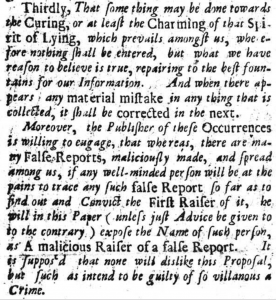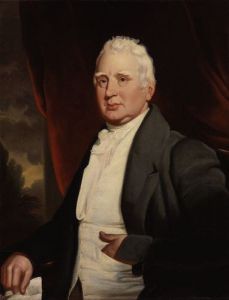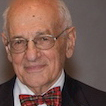
Waud, A.R. "An Armed Neutrality." Engraved by G.H. Hayes. p. 291 in Beyond the Mississippi by Albert Richardson. Hartford, Connecticut: American Publishing Co., 1869.
In these revealing first 10 days of the Trump presidency, as we were tasting the bitter cup of what this train wreck of an election was going to mean for democracy in the United States, I had one brief moment of respite. It was when The New York Times, in a headline on the day after the inauguration, virtually shouted, “With False Claims Trump Attacks Media on Turnout and Intelligence Rift.” There it was, right out there in the supposedly opinion-free purity of the front page. False! My doorstop of a Webster’s Deluxe Unabridged Dictionary has several definitions of the word, including “untruthful, lying, dishonest.”
A lesson learned! Away with Iraq-era “factually inaccurate” whitewashing. The news of the day was that the president was a liar.

In the first issue, dated Sept. 26, 1690, Publick Occurrences editor Benjamin Harris explained one of his chief goals in launching the paper was to expose lies and liars. (Credit: Wikicommons)
Welcome back, genuine journalism and journalists. You are repeating an honorable history. The very first American newspaper was published in Boston in 1690 by a printer and bookseller named Benjamin Harris, a little trifle of three 6-by-10 inch pages that he titled Publick Occurrences: Both Foreign and Domestick. Among his stated reasons for the enlightenment of his Boston neighbors was to cure “that spirit of lying, which prevails amongst us.” That did it! The governor and council of Massachusetts, stung by such “reflections” as well as the fact that Harris hadn’t applied for an official license, shut him down immediately. Luckily, Trump doesn’t have that kind of power, at least not yet.
Predictably in the aftermath of the Times’ story there was a great deal of public hand-wringing on how the “media” should handle the unprecedented situation of a president who had proven over and over during the campaign that “truth” was whatever he was proclaiming at the moment, regardless of facts. And he now had a press secretary and a “special counselor,” i.e., Minister of Propaganda Kellyanne Conway, to conveniently present “alternative facts” supported by no evidence whatsoever. To call them outright “lies,” however, struck some publishers and network executives as violating the impartiality with which news was to be presented.
But here’s what one newspaper owner-editor in the earliest days of our republic had to say on that subject:
Professions of impartiality I shall make none. They are always useless and are besides perfect nonsense when used by a newsmonger; for, he that does not relate news as he finds it is something worse than partial… and he that does not exercise his own judgment, either in admitting or rejecting what is sent him, is a poor passive tool, and not an editor.

Portrait of William Cobbett painted circa 1831 by artist George Cooke (National Portrait Gallery UK)
That was a Federalist partisan, William Cobbett, speaking in the midst of bitter political warfare during which no one, not even the most exalted, was safe from calumny. The opponents of the Federalists were “Republicans” — no relationship to today’s party of that name — and here is what Benjamin Bache, one of their editors, wrote at the time of Washington’s retirement: “If ever a nation was debauched by a man, the American nation has been debauched by Washington… If ever a nation was deceived by a man, the American nation has been deceived by Washington.” And that attack didn’t run from the shelter of an “editorial” page. No such thing existed until later.
Where, then, did that ideal of news neutrality come from? Not until nearly a century later. Up until the years shortly before the Civil War, partisan journalism was the norm and it didn’t matter much because there were plenty of newspapers on every side of an issue. Hand presses putting out small runs were inexpensive, paper and ink could be bought on a shoestring, and the enterprise could be run at the startup by a small staff, sometimes just the owner acting as a one-man reporter, editor, circulation and advertising manager. You could pick the paper that spoke for your side.
Then technology muscled in. Newspaper offices became factories whose basements housed giant steam-powered presses spewing out hundreds of thousands, even millions of newspapers in a few overnight hours. In the heyday of the now vanishing newspaper only multimillionaires could dream of the ownership or even chain ownership, which squeezed the number of available news sources down to a precious few. The biggest tigers roared the loudest and often had nearly identical opinions natural to multimillionaires. If those were presented wrapped in the guise of “news” then truth might simply appear as an item on the tigers’ dinner plates. It was that possibility that encouraged the practice of professionalizing journalism by building a protective wall between editorial and news pages. And so for years journalism as a corporately owned megabusiness grew and flourished.
But the objective ideal, carried to extremes, stands in the way of another and crucial objective of journalism — both print and electronic — besides profit making. It’s what the lawyer for John P. Zenger spoke of at the printer’s trial for libel in 1735 — the charge being New York’s royal governor Cosby’s retaliation for unfavorable articles (and the very tactic that Trump has promised to use against his critics.)
The lawyer said to the jury that the cause was
not the cause of the poor printer nor of New York alone… [but] the cause of liberty. And if the jurors did their duty your upright conduct this day will not only entitle you to the love and esteem of your fellow citizens but every man who prefers freedom to a life of slavery… Nature and the laws of our country have given us a right — the liberty both of exposing and opposing arbitrary power… by speaking and writing truth.
And the jury gloriously performed its duty by acquitting Zenger who had languished in jail while awaiting trial even though the law as then written was on the governor’s side.
That’s the basic mission statement of the duties of an independent media all these years later. Good journalists around the world have also languished in jail for it and in some cases died for it. And we need to beware of those who will pervert it with pretended neutrality. Fox News trumpets its motto as “We report, you decide.” And 90 percent of what they report comes from right-wing blowhards like Sean Hannity and Trumpian bullies like Bill O’Reilly. “We report, you decide” is an imposture. It’s the nightcap and shawl that the wolf wore to lure millions of Red Riding Hoods to within range of its sharp teeth.
There can be only one stance for independent media outlets during the multiple crises that will threaten us during this administration. That is, in the face of threats from Trump and his alt-brain, Stephen K. Bannon, who told reporters plainly to “shut up” without specifying an undefined “or else.” The mission is to call out and chastise the spin doctors and falsifiers who pour poison into the wells of good investigative reporting. It is to fight back with a counterblast of truth on the front pages or in the lead story on the newscasts or on the Facebook walls of the news websites — the first thing that readers and viewers with short attention spans see.
It means the most rigorous possible fact checking with staffs large enough to do their job in reasonable time frames (sadly, exactly what most websites, which are sometimes assumed to be the antidote to the lack of diversity, don’t have, and which the few remaining nationally significant newspapers are themselves cutting down.) It means demanding of the major networks that they divorce the unholy marriage between news and entertainment departments that have become near-normal and promoted the fatal process described by Neil Postman as “amusing ourselves to death.” It means public mobilization of indignation against network executives like CBS’ Les Moonves, who put profit above principle in encouraging the kind of food fights and mudslinging that disgraced the campaign. And it means forgetting shabby defenses of “respect for the office, but not the man” used to tut-tut hard-hitting words at the new president — words as blunt as Tom Paine’s when he called His Sovereign Majesty King George III a “royal brute.”
When Adolph Ochs, who bought the small New York Times in the 1890s and started its upward career, adopted the motto “All The News That’s Fit to Print” he was setting forth a worthy objective. But in this age of spin, truthiness, alternative facts and denial of even the truths of science, the decision of what’s fit to print can’t be limited to what is inoffensive to those in the highest ranks of any administration. What genuine journalists must do is reject the role of stenographers and enlist themselves as gladiators!




